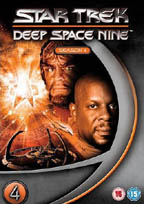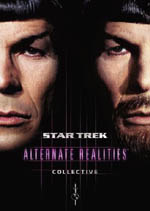
STAR TREK:
DEEP SPACE NINE:
Season Four:
|
Star Trek DS9 Season 4
But the episode also has two significant caveats. The first is that it doesn't quite snap Benjamin back into place very elegantly. Instead, it attempts a re-wind on the action, inexplicably dropping a more experienced Benjamin on top of some prior version of himself. One hopes he is back at the same point of time, space, AND CHOICE that he left at the beginning of the story, namely back in the same parallel/branching universe. I think it would have been better had he been seen to materialize just after he first vanished, thus acknowledging the journey he had just completed. Mind you, doing that without buggering up the explanation of Jake "dragging him through time like an anchor" might require that we also address the other caveat of the story. I just hate it when writers reach for the daftness of "death" as a way of exiting dreams, fantasies, and time-travel conundrums. It's so lame, destructive, counter-productive, and unlikely to be any kind of accurate blueprint for how to deal with such things for real. I think it sets a bad example for viewers, and other Trek writers like Ron Moore abuse and overuse death and loss so often on this show that it feels a bit cliché and re-run. A better solution specifically for this episode might be, after Jake watches his father vanish from the engine room, and while he is still holding onto that piece of equipment and the energy discharge is still flowing around him, he gets a determined look, extends his arm, the discharges coalesce on the other end, and the father rematerializes there and then. Now not only is Benjamin remembering the adventure, but something from the older parallel Jake has bled through to our familiar younger version as well, inspiring a bit of proactivity and assertiveness on his response to the situation. Either way, there will always be a parallel world out there where Jake Sisko wrote Ansolom and two collections of short stories, to be enjoyed for Millennia ever after. Sweet. This story gives us a nice peek into a possible future where we get to see what may happen to many of the DS9 characters in the future, almost doing the same thing as "All Good Things...." in brief. In my opinion, this episode is the better one. And eerily enough, one has to wonder if the future we do follow along with is really all that different, having simply delayed Sisko's departure for about four more years.... I have to say, I found Worf's cameo presence in this episode to be both a bit jarring and unsatisfying. I had thought he was merely a guest star in the double-length opener of the season. (I think the confusing dialogue in the opener's coda about Sisko trying to find him a new posting on some other spacecraft somewhere, along with the concept that Worf's inner conflict is resolved just by his decision to remain in Starfleet, made me believe he was warping off into the sunset in that new red uniform at the end of that show.) His continued presence in this next episode here is what would make real the idea that he had joined the crew, and yet the episode tosses his presence off into the background and gives him next to nothing to do, as though we should have already accepted it. It isn't until his brilliant clash with Odo in the next episode that Worf really gets his due from the idea that he has joined this crew, and I have to consider that it might have been a better idea to swap the two episodes in the running order, as indeed they were in production order. Still, "The Visitor" is a stronger attention-grabber, so the case is not all that clear cut. While we're here right at the beginning of Season Four, we may as well comment on the new title sequence. I do really like the extra activity all around the DS9 station in the opening, featuring more runabouts early on and showcasing the Defiant in the final segments very nicely. The music is also upgraded, which seemed like a good idea. I had always thought it was missing a good strong, driving rhythmic bassline. But I have to take issue with what was thrown together here. The familiar melody and new bassline here appear to be completely out of sync with each other, each doing its own thing and paying no attention to the other. Additionally, the bassline has no chord movement. It's a mindless piece of filler, disrupting far more harmony than it created. All things considered, the title cue for the first three seasons was better.
Little Green Men(Star Trek - Deep Space Nine episode production code 480)story by Tony Marberry & Jack Treviño teleplay by Ira Steven Behr & Robert Hewitt Wolfe There's one simple good idea behind this episode: to deposit our favourite Ferengi family in Roswell, 1947, and milk the situation for laughs. And while there are a few good laughs, it seems there aren't quite enough of them to really justify the exercise. A bit too much time seemed to be spent on 1947 characters who have inexplicable foresight of how Roddenberry's noble visions will become reality in the future, usually the most icky portions of whatever scenes they appear in. The Ferengi commentary on 20th century America is much more worthy and entertaining. At any rate, putting this all together requires time travel, and Star Trek really just muddles through its usual rut here. There are no major mistakes, challenges, or advancements in temporal navigation in the events on screen here, but as usual the dialogue is set to lead the audience into the usual wrong theories where the writers have parked their own brains. Sad. Most bizarre is that the writers looked at the collection of characters they wanted for the episode and decided that today's expert on Trek time travel would be.... Rom? Lord help us! I like that Rom has more technical skills than his brother would give him credit for, but time travel expert? That goes too far. Rom is still a bit too much of an idiot for such advanced physics and, in this case, chemistry. One of the gems of this episode though is the element of all the lengthy goodbyes to Nog on Deep Space Nine at the beginning of the show, giving the rest of the crew something to do and ultimately having more lasting impact than the 1947 bits. Nice stuff. This is an enjoyable episode, even if it didn't quite deliver so well on what it had advertised.
Crossfire(Star Trek - Deep Space Nine episode production code 485)written by René Echevarria Mid-season episodes can often reveal writers reaching for their habitual crutches. First up is René Echevarria falling back on anthropomorphism. I was never comfortable with this arc of Odo getting a hopeless crush on Major Kira, mostly because it's too much of a hormonal thing, and Odo really shouldn't have the hormones for it, if you follow through on the logic of his character as it has been presented so far. He really doesn't imitate humanoids that well, and he should be more attracted to something a little more closely resembling himself. Mind you, as a long-term subplot, it seemed to be remaining respectable while simmering on the backburner, lending something to Odo's loyalties now that he's found his own people. But this episode pushes it firmly to the foreground, to the point where we the audience hardly even care if Worf apprehends today's assassin or not in the B-plot. Anyway, it's a disappointing anthropomorphism, and despite a heartfelt and engaging performance from René Auberjonois as Odo, the idea contradicts Odo's biochemistry too strongly for me to care to invest in it.
The Sons of Mogh(Star Trek - Deep Space Nine episode production code 487)written by Ronald D. Moore Next, Ron Moore reaches for his favourite crutch: death and loss, squeezing his characters with it to give them something big to emote. This is usually the true core element that I dislike in so many time travel stories, particularly when I believe science doesn't support the conundrums that are seen to force it onto the characters. Well, there may be no time travel involved here, but the reasons for pre-planning all the death and loss in this episode are equally lame and backward. It's amazing what crap Moore will invent as "Klingon culture" as a contrivance for today's losses, while ignoring all manner of good, logical, proactive choices for his characters. Some of those other choices are dabbled with here, and would easily have been far more interesting, fascinating character arcs to explore in the long term. But, Moore is determined to follow a dumber path, it seems... Dax thinks she's got a really great idea near the end, but she must be thinking twice about that in the solemn scene at the end when the brothers part. Memory erasure is always such a stupid thing whenever it comes up in Star Trek, as though medicine can just do it with a snap of the finger. As usual, motivation for it is unclean, just an excuse for those people who can't think and live and act on better principles. Ugh. It's on account of episodes like this why I turned away from Battlestar Galactica after seeing what Moore wanted to focus on in his new pilot for the series. Death and loss are of VERY limited interest to me dramatically speaking. There's only so much you can do with it before it all repeats itself unnecessarily, and the alternatives are so much more fascinating. Time for Moore to take heed of Sisko's classic speech from season two's three-part opener. Dying for a cause is easy. It lets you off the hook. Living for a cause takes much more imagination and courage, and is so much more effective and rewarding.
These Deep Space Nine Season Four stories are available on DVD. Click on the Amazon symbol for the desired disc format and location nearest you for pricing and availability:
Article written by Martin Izsak. Comments on this article are welcome. You may contact the author from this page:
|
|||||||||||||||||||
|
| ||||||||||||||||||||

LYRATEK.COM |
|
|||||||||||||||||||



 Region 1, NTSC, U.S.
Region 1, NTSC, U.S. Region 1, NTSC, Canada
Region 1, NTSC, Canada Region 2, PAL, U.K.
Region 2, PAL, U.K.

